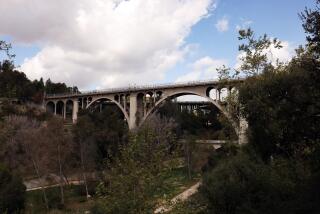Blair labors in an elegant piece of Mideast history
- Share via
JERUSALEM — Tony Blair is not the first outsider to try to change the Middle East from the elegant corridors and intrigue-steeped courtyards of one Jerusalem hotel on the line dividing Arab and Jew.
For 125 years before the former British prime minister set up his offices in a large suite at the American Colony this summer, the Jerusalem institution has been drawing pilgrims and spies, diplomats, generals and journalists. They have come for redemption, information, or for the renowned Saturday buffet.
At lunchtime one day in October, a guest sunbathed in a bikini on grass between the pool and the minaret of a nearby mosque. European diplomats with expensive haircuts and BlackBerrys occupied two of the tables in the central courtyard, next to a fountain installed by the Arab nobleman whose mansion this once was. Another table was taken by Mordechai Vanunu, who spent 18 years in prison for divulging Israel’s nuclear secrets to a British newspaper.
Blair, the latest addition to this mix, is now the envoy for the so-called quartet of Mideast mediators -- the United States, European Union, United Nations and Russia. His job is to help found a functional Palestinian state, and he has been equipped with an international staff of 14 and a first-year budget of $8 million to make that happen.
Blair’s staff would not allow the Associated Press to see his offices and would not say why he chose the Colony as his base of operations.
But aside from the obvious comforts of the Colony, the decision probably was linked to its location on the border between the Arab and Jewish sides of this fractious city, and even more so to the years it has served as a fittingly picturesque backdrop for Mideast deal making.
“The American Colony is not identified with Arabs or with Jews. It’s seen as something neutral in the middle,” said Ruth Kark of Hebrew University in Jerusalem.
The Colony, possessed of a charm lacking in Jerusalem’s many other hotels, is meticulously calibrated to evoke the allure of a long-ago vanished Orient, if it existed at all. A room can be had for $400 to $700 a night.
The American Colony has its roots in fervent faith and tragedy. Its founders, Anna and Horatio Spafford, millennialist Protestants from Chicago, came to the Holy Land in 1881 after losing their four daughters in an Atlantic shipwreck and then a son to scarlet fever. They hoped to be present when Jesus returned to Jerusalem.
Accompanied by an expanding group of followers, Americans and Swedes, the Spaffords eventually bought a home in which an Arab notable used to house his four wives and children.
In what was then a poor city in a neglected province of the Ottoman Empire, the Spaffords goal was to live spartan, communal lives while doing charitable works and waiting for the Second Coming. Their colony was a kind of Christian proto-kibbutz.
Rumors swirled in the early years about residents’ alleged orgiastic practices and polygamy, but though the community’s sexual practices were indeed unorthodox, the truth was apparently quite different. For a time, they observed strict rules of celibacy and even banned marriage because Anna deemed it little more than a “license to sin.”
The Colony’s residents made a point of providing help to Jews, Muslims and Christians, and treated both Turkish and British wounded during World War I. When the Turks surrendered in 1917, their white flag was a sheet from the Colony’s hospital, ripped in two and tied to a stick.
The arrival of the British that year marked the beginning of the stream of high-profile Western guests of whom Tony Blair is only the latest.
Sir Edmund Allenby, who commanded the British forces, stopped by often, and T.E. Lawrence, better known as Lawrence of Arabia, was a regular dinner guest.
The Colony was damaged in the fighting before Israel’s independence in 1948, when it fell under Jordanian control, becoming one of the only places in the Arab part of the city where alcohol was sold and thus the prime hangout for reporters.
It was damaged again in the 1967 Mideast war, when Israeli troops threw a grenade into the bar to flush out a sniper.
The hotel, like the rest of East Jerusalem, has been under Israeli control since then.
More to Read
Sign up for Essential California
The most important California stories and recommendations in your inbox every morning.
You may occasionally receive promotional content from the Los Angeles Times.










